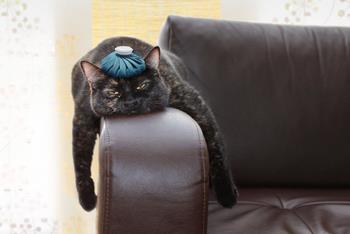Grooming is a natural behavior of cats, but should a cat be licking its skin and perhaps even losing hair because of it? Of course not, that isn’t normal.
In this article, you are going to learn about the most common causes of excessive grooming in cats, and several ways to prevent your cat from overgrooming itself.

What is excessive self grooming?
Before we start, let’s “define” what is meant by “excessive” when discussing your cat’s self-grooming. A cat’s licking itself often is not necessarily excessive, because it’s natural for cats to lick themselves often.
How often do cats normally groom themselves? As it turns out—a lot. A cat may spend up to 50% of its awake time grooming itself (Source: “Feline Behavior: A Guide For Veterinarians” by B.V. Beaver.). More than that should be considered abnormal, and everything significantly more should be considered excessive.
This measure by itself isn’t much of a help, because even if you see your cat grooming itself every time you look at him, it may still be within the normal range. Fortunately, there is one more important thing to consider.
Is your cat losing hair? IMPORTANT: It’s not normal for a cat to develop bare patches on skin due to self-grooming. If this happens, you should seek professional help.
Possible causes of excessive grooming in cats
Now that you are aware that your cat is licking his fur too often, you should find out why it happens.
You should understand that excessive grooming is not from an alien planet. Excessive grooming is done for exactly the same reasons as “normal” grooming: it’s just that this reason becomes exaggerated in the case of excessive grooming.
Normally, cats groom to get rid of dead hair, dirt, parasites and food leftovers from his fur. In the wilderness, grooming helps maintain coat and skin quality, and also masks the cat’s presence from his prey and from larger predators. You can find more information about grooming in cats here.
Grooming also helps to reduce anxiety and stress. It’s a useful distraction from a stressful situation. It’s similar to when we rummage through our purses, gaze intently at our mobile phones or talk about the weather to avoid the awkwardness of a moment.

In our practice, we find that the most common causes for cats to lick themselves excessively are:
- The cat is trying to relieve stress, mild or severe.
- Parasites, such as fleas or mites, are causing an itch.
- Skin diseases and allergies are causing an itch.
Note: keep in mind that your cat may be losing hair not because of grooming, but for other reasons including certain medical conditions, incomplete nutrition, and allergic reactions.
If the information above explains why your cat is losing hair, you can now work on the cause.
How to stop excessive self-grooming in cats
First, you should visit a veterinarian to find out if your cat’s hair loss and overgrooming isn’t a medical thing. A common cause is an itch due to skin parasites or allergies. In case of those, you would work according to your veterinarians instructions. If your veterinarian says that the cat is medically fine, the most likely answer to your cat’s overgrooming is stress.
SERIOUSLY? Do cats have stress? Of course they do, they live with us!
So, how do you stop a stress in cats?

To alleviate your cat’s stress, it’s necessary to get to the root of the problem and find out what is causing it. No, you do not need to bring your cat to the psychotherapist to explore deeply hidden childhood fears.
Cat behaviorists, however, may be able to help, especially if your cat’s problem is severe. If you want to start on your own, here are the most common causes of stress in cats. Once you know the source, it becomes easy to work with.
Most often cat owners remember something that has changed before the problem appeared. For example, there was a new arrival in the family, or someone left it. New furniture was introduced, house repairs were done, or perhaps there the family even relocated.
In these cases, you need to make sure the new experience is as stress-free as possible by associating something positive with it, like feeding a favourite meal or treat in the presence of the new person, and making sure the cat is not bothered unnecessarily during the exercise.
If the change consists of a new home, limit your cat’s access initially to just one or two rooms, and make those rooms calm and comfortable for your cat (see here how).
The source of the stress may not be limited to that which is described above. Your cat may even be bothered by outdoor cats wandering by his window, or by a visible but unreachable bird feeder (just remove it), a lack of activity, and many other reasons.
We can’t cover every situation here, but here is a general approach to minimize the stress in cats:
- If possible, remove or reduce the source of the stress.
- Create a predictable routine for your cat. At the very least, meal times should be predictable.
- Play a lot with your cat. Playing has many benefits, and stress relief is among the most powerful benefit of them all.
- Whenever you see your cat licking his fur, distract him by inviting him to play.
- Enrich your cat’s environment so that he can climb up onto perches, ledges or other furniture in at least several locations.
As we’ve said earlier, we can’t cover every situation here. The methods above work well in the majority of cases, but you can read more about reducing your cat’s stress here.
If you are still having problems, do not hesitate to seek help from a professional cat behaviorist or a knowledgeable veterinarian. Excessive grooming, if left untreated, can become severe and very difficult to stop without an extensive behavior modification plan, or even medical drugs.
